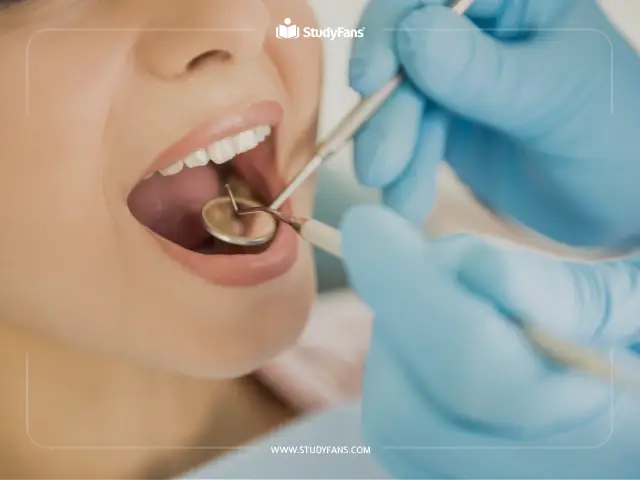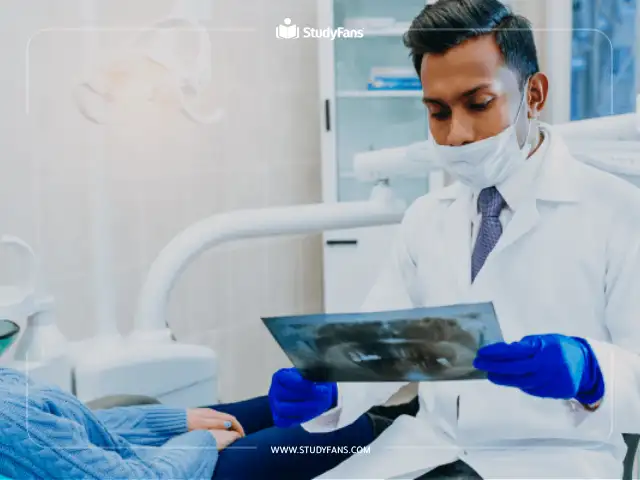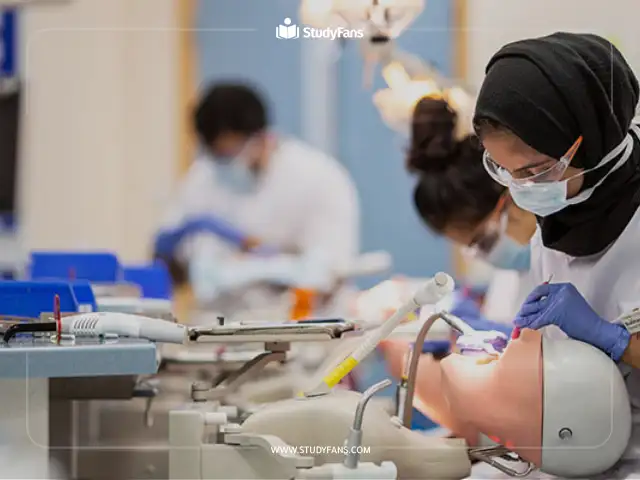Many students from different countries of the world who are interested in medical sciences wonder why they study dentistry and the best universities they may attend to study dentistry. Through the article, here is an introduction to the dental profession, the advantages of studying it, the specifications of the student who may join it... and others.

What is Dentistry?
Dentistry is a branch of the medical profession concerned with the treatment and prevention of oral diseases, including diseases of the teeth, supporting structures, and gum disease. Dentistry also includes a cosmetic part, which includes the treatment and correction of jaw deformities, tooth misalignment, and deformities in the oral cavity. Dentistry includes many specialties and subspecialties, including orthodontics, pediatric dentistry, periodontal disease, prosthodontics, oral and maxillofacial surgery, public health dentistry, and oral and facial radiology.
The practitioner of that profession is called a dentist.

Why to Study Dentistry?
If you are thinking about studying dentistry, here are the most important reasons that might push you to do so:
Precision and discipline
Compared to other fields of medicine, dentistry offers a precision that many students find interesting. The dental profession is automated, precise, and repetitive.
This precision in work includes diagnosing the condition and the tools that the dentist uses in dealing with patients.
Feeling happy
Work directly affects the patient's condition and physical health. Proper handling of the patient’s condition leads to a change in his life for the better, which creates a feeling of satisfaction and happiness for the dentist.
Independent career
Once you graduate, you can work independently, by opening your clinic and defining yourself.
You can also work in a general clinic or a hospital.
The dental profession also allows you financial independence, as dentists receive high salaries.
Work-life balance
You need to attract more patients to your practice and hire the right people to accommodate them. Allowing you to invest in yourself and your employees.
Lifelong relationships
The dental profession allows you to see and treat many people, and establish long-lasting friendships. This is critical to your success and patient comfort.
International skills
Studying dentistry will make you employable anywhere in the world.

What does a student study in Dentistry?
A career in dentistry is not only about learning the practical skills needed for patient examination and dental procedures but to be a competent clinician, you must possess the set of professional skills required to begin independent practice and work within a dental team
The study of dentistry includes four main areas:
Clinical field
It represents the largest part of the undergraduate dentistry curriculum and includes the study
Basic sciences such as:
General human physiology
Anatomy, diseases, and their relationship to the mouth.
Physics
Diagnosis and management of diseases of the teeth, jaw bones, and lining of the mouth.
Preventing dental disease and other public health problems.
Infection control, including disinfection of dental equipment. How to give dental local anesthesia injections
How to extract and replace teeth.
The skills needed to read and critically evaluate scientific papers allow you to determine how to manage your patients.
Professional
Ethical and legal obligations of the dentist
Putting patients' interests first.
Work as one team to provide the best service and care to patients.
Being a reflective practitioner looks carefully at your past decisions and practices, and what you can do to the importance of patient safety
Communication
Behavioral science and how to communicate with patients and the rest of the medical team How to manage dental anxiety that patients data.
Skills in dealing with patients, in terms of motivating them about their oral hygiene and diet habits, and explaining all information clearly to patients.
Leadership and management
Study leadership, and how to be a good leader in the operating room, your private clinic, or in the hospital.
How to manage patient complaints.
Study the various regulatory and legal requirements for the practice of dentistry.
The importance of improving health care and improving quality.
Admission requirements for Dentistry
Scientific high school certificate only
Pass the IELTS test to prove proficiency in the English language with scores higher than 6.5
IGCSE and GCSE
The total number of subjects to be calculated is (8) subjects
The passing grade in the subjects (OL) is “C”.
The passing grade in (AL or ASL) is “D”
Acceptable degrees must be taken within a period of no more than 4 consecutive years.
There are (5) qualifying subjects:
English Language or English Literature.
One of the branches of mathematics.
biology
chemistry
Physics
The student must take at least (3) other subjects.
Eligible scores in the UK Clinical Aptitude Test (UKCAT) or Biomedical Admissions Test (BMAT)
Studying dentistry in Turkish universities requires the following
High school certificate
matriculation
Linguistic proficiency in the English language
Admission tests such as YOS, SAT, ACT, International Baccalaureate, ABITUR, and others.
Other requirements may be recommended, such as letters of recommendation, interviews, or the applicant's personal information.
The cost of studying Dentistry all over the world
Tuition fees for studying dentistry vary from one country to another, as follows:
Türkiye: From $12,000 to $27,000 depending on the university the student studies at.
United Kingdom: Tuition fees for international students, including EU, will be £36,500 annually.
United States of America: from USD 67,000 to USD 135,600.
Canada: From $23,000 to $27,000 depending on the academic year.
What are the qualities that Dentistry students should have?
Dental applicants must have a set of personal attributes that allow them to work with patients and be successful practitioners of their profession.
Trustworthy
The dentist must be trustworthy by patients not to harm them, and take all necessary precautions to make treatment sessions pain-free.
Attention to detail
Because the mouth is a very small area to work in, the dentist must pay attention to details. To ensure the health of the patient's teeth.
Leader
A dentist must have the ability to lead a team of dental hygienists, technicians, and assistants, manage other employees, such as the receptionist, and make high-level decisions for the practice.
Enthusiasm for the dental profession
A successful dentist enjoys his work and is always fascinated by the mouth and its connection to the rest of the body.
Good communication
The dentist must have good language to communicate with the patient, the ability to summarize complex procedures and operations into simple language that the patient understands and to agree to any procedures suggested by the dentist.
Paying attention to the patient's feelings
A good dentist should do his best to make patients feel comfortable and relaxed without pain while performing therapeutic procedures.
Postgraduate Studies for Dentistry
The College of Dentistry offers six postgraduate programs:
Master of Dental Sciences, specializing in Oral and Maxillofacial Surgery.
Master of Dental Sciences in Prosthodontics
Master of Science in Endodontics
Master of Science in Surgical Dentistry
Master of Dental Sciences specializing in Oral Medicine, Periodontology, and Oral Diagnosis
Master of Dental Sciences in Pediatric Dentistry
Job opportunities for Dentistry graduates
The field of dentistry includes caring for the mouth and gums, and there are many jobs that a dentist can fill, including:
Dentist: diagnoses and treats the mouth, including the gums, teeth, and other related parts, and conducts the necessary examinations and treatment procedures.
Dental hygienist: Provides preventive dental care to patients, including performing examinations, cleaning teeth, and educating them about good oral hygiene practices.
Periodontist: diagnoses and treats problems with the gums and bones surrounding the jaw, place implants, provides preventive care for the patient, develops treatment plans for patients, and identifies surgical and non-surgical options for treating gum problems.
Orthodontist: Examines and treats deformities of the oral cavity, straighten teeth and jaws, develops treatment plans, prepares braces, retainers, and other dental appliances, and maintains treatment records.
Oral and maxillofacial surgeon: performing surgical operations on the facial, maxillofacial, and mouth areas and removing damaged and non-restorable teeth.
What is a Dentistry salary?
The average salary of a dentist in Egypt is about 118,000 Egyptian pounds annually.
While it amounts to 541,404 Turkish liras per month in Turkey and reaches 300,000 dollars annually in the United States, 35,000 British pounds sterling, and 200,000 dollars annually in Canada.
Best universities to study Dentistry
According to QS World University Rankings, the top 10 dentistry schools are:
University of Michigan - Ann Arbor
Academic Dental Centre, Amsterdam
University of Hong Kong
Tokyo Medical and Dental University
King's College London
University of Bern
Karolinska Institutet
University of Zurich
University of California
Harvard University
The best Turkish universities to study dentistry
Bahçeşehir University
Conclusion
Dentistry is a branch of the study of medicine that treats and even prevents oral problems. Many universities around the world allow the study of this specialty to graduate experienced dentists with experience in dealing with patients and ensuring oral and dental health.
If you wanted to know more or have any questions, we are here to help you and you can always contact us:
Phone: 00905437394024
Or via WhatsApp through this link.





